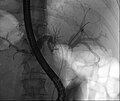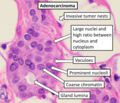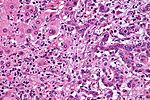A Klatskin tumor (or hilar cholangiocarcinoma) is a cholangiocarcinoma (cancer of the biliary tree) occurring at the confluence of the right and left hepatic...
11 KB (1,139 words) - 20:28, 29 October 2024
Neuroendocrine tumors (NETs) are neoplasms that arise from cells of the endocrine (hormonal) and nervous systems. They most commonly occur in the intestine...
87 KB (8,009 words) - 05:16, 19 October 2024
Warthin's tumor, also known as papillary cystadenoma lymphomatosum, is a benign cystic tumor of the salivary glands containing abundant lymphocytes and...
7 KB (686 words) - 21:23, 28 March 2024
A Krukenberg tumor refers to a malignancy in the ovary that metastasized from a primary site, classically the gastrointestinal tract, although it can...
10 KB (1,060 words) - 20:37, 16 May 2024
Carcinoid (redirect from Carcinoid tumor)
A carcinoid (also carcinoid tumor) is a slow-growing type of neuroendocrine tumor originating in the cells of the neuroendocrine system. In some cases...
15 KB (1,513 words) - 03:43, 7 January 2024
Adenocarcinoma (redirect from Adenocarcinoid tumor)
or adenocarcinomata /ˌædɪnoʊkɑːrsɪˈnoʊmətə/; AC) is a type of cancerous tumor that can occur in several parts of the body. It is defined as neoplasia...
14 KB (1,396 words) - 02:27, 2 September 2024
Cholangiocarcinoma (redirect from Bile duct tumor)
to form the common hepatic duct may be referred to eponymously as a Klatskin tumor. Although cholangiocarcinoma is known to have the histological and molecular...
74 KB (7,649 words) - 05:26, 16 August 2024
An adenoma is a benign tumor of epithelial tissue with glandular origin, glandular characteristics, or both. Adenomas can grow from many glandular organs...
13 KB (1,370 words) - 05:11, 25 July 2024
carcinomas: 724 and 20% of malignant ovarian tumors.: 728 Ovarian endometrioid tumors are part of the surface epithelial tumor group of ovarian neoplasms (10–20%...
7 KB (546 words) - 23:07, 8 March 2024
A VIPoma or vipoma (/vɪˈpoʊmə/) is a rare endocrine tumor that overproduces vasoactive intestinal peptide (thus VIP + -oma). The incidence is about 1...
6 KB (658 words) - 12:17, 12 August 2024
PanNETs are a type of neuroendocrine tumor, representing about one-third of gastroenteropancreatic neuroendocrine tumors (GEP-NETs). Many PanNETs are benign...
28 KB (2,471 words) - 07:39, 19 October 2024
prolactinoma is a tumor (adenoma) of the pituitary gland that produces the hormone prolactin. It is the most common type of functioning pituitary tumor. Symptoms...
23 KB (2,763 words) - 03:58, 19 October 2024
local tissue and stromal architecture The anatomical location from which tumors arise Genetic, epigenetic, and molecular features Adenocarcinoma (adeno...
30 KB (3,246 words) - 20:16, 22 October 2024
International Classification of Diseases for Oncology (section 868–871 Paragangliomas And Glomus tumors)
C24.0) M8161/3 Bile duct cystadenocarcinoma (C22.1, C24.0) M8162/3 Klatskin tumor (C22.1, C24.0) M8170/0 Liver cell adenoma (C22.0) (M8170/3) Hepatocellular...
138 KB (9,870 words) - 22:47, 9 June 2024
cytological, or molecular properties of both epithelial tumors ("carcinoma") and mesenchymal tumors ("sarcoma"). It is believed that sarcomatoid carcinomas...
4 KB (315 words) - 14:12, 20 March 2022
A thymoma is a tumor originating from the epithelial cells of the thymus that is considered a rare neoplasm. Thymomas are frequently associated with neuromuscular...
13 KB (1,332 words) - 07:23, 30 August 2024
a rare type of cancer that can exist in many different body sites. This tumor most often occurs in the salivary glands, but it can also be found in many...
13 KB (1,533 words) - 19:39, 18 September 2024
Hürthle cell (redirect from Hürthle cell tumor)
associated with Hashimoto's thyroiditis as well as benign and malignant tumors (Hürthle cell adenoma and Hürthle cell carcinoma, formerly considered a...
9 KB (993 words) - 03:28, 2 September 2024
distinct syndromes featuring tumors of endocrine glands, each with its own characteristic pattern. In some cases, the tumors are malignant, in others, benign...
21 KB (2,231 words) - 12:09, 12 August 2024
Glucagonoma is a very rare tumor of the alpha cells of the pancreas that results in the overproduction of the hormone glucagon. Typically associated with...
8 KB (808 words) - 21:15, 19 November 2024
Mucoepidermoid carcinoma (redirect from Mucoepidermoid tumor)
clinically as mixed tumors. Usually occurs at 30–50 years of age. More predilection towards female sex.[citation needed] This tumor is not encapsulated...
10 KB (916 words) - 01:42, 17 September 2024
absence of metastases, whether or not the tumor appears limited to the thorax, and whether or not the entire tumor burden within the chest can feasibly be...
44 KB (4,353 words) - 22:18, 28 September 2024
Sacrococcygeal teratoma (redirect from Sacrococcygeal tumor)
Sacrococcygeal teratoma (SCT) is a type of tumor known as a teratoma that develops at the base of the coccyx (tailbone) and is thought to be primarily...
21 KB (2,556 words) - 16:46, 10 January 2024
Burns, William R.; Edil, Barish H. (March 2012). "Neuroendocrine Pancreatic Tumors: Guidelines for Management and Update". Current Treatment Options in Oncology...
13 KB (1,375 words) - 12:10, 12 August 2024
histopathology of tumors. 3rd Ed. p. 931-932. Arpino G, Bardou VJ, Clark GM, Elledge RM (2004). "Infiltrating lobular carcinoma of the breast: tumor characteristics...
8 KB (582 words) - 02:54, 14 May 2024
Basal-cell carcinoma (redirect from Basal cell tumor)
the local immune system, possibly decreasing immune surveillance for new tumor cells. Studies of the role of DNA repair in susceptibility to sunlight-induced...
55 KB (5,426 words) - 04:15, 2 November 2024
cancer after lung adenocarcinoma and it originates in the bronchi. Its tumor cells are characterized by a squamous appearance, similar to the one observed...
14 KB (1,563 words) - 14:58, 30 October 2023
Gastrinomas are neuroendocrine tumors (NETs), usually located in the duodenum or pancreas, that secrete gastrin and cause a clinical syndrome known as...
18 KB (1,916 words) - 00:54, 11 August 2024
Syringomas are benign eccrine sweat duct tumors, typically found clustered on eyelids, although they may also be found in the armpits, abdomen, chest,...
7 KB (760 words) - 14:35, 8 July 2024
gelatinous ascites. The tumors cause fibrosis of tissues and impede digestion or organ function, and if left untreated, the tumors and mucin they produce...
20 KB (2,340 words) - 13:51, 31 October 2024

























